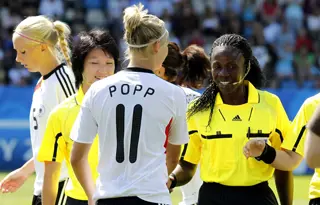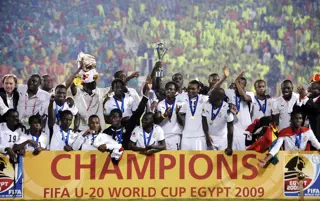News
People of the Union: Catherine Brenya (Ghana)
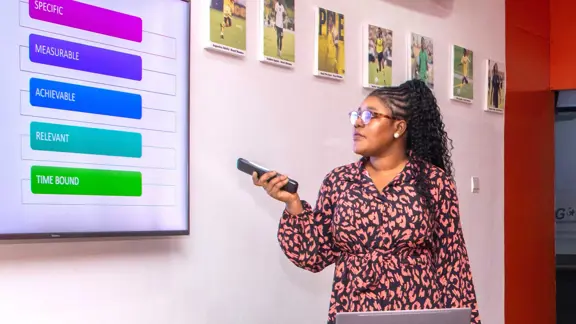
People of the Union puts the spotlight on individuals across FIFPRO’s member associations who are dedicated to improving the wellbeing of professional footballers.
Catherine Brenya is the Professional Footballers Association of Ghana's Human Resource and Administrative Manager. Brenya talks about her passion for empowering players through education and preparing them for life after football.
FIFPRO: Tell us about yourself: what is your current role and what is your background?
Catherine Brenya: I'm the Human Resource and Administrative Manager for the Professional Footballers Association of Ghana (PFAG). After graduating with a degree in Management Studies, I joined the union on 30 June 2014. In 2020, I earned a master’s degree in Human Resource Management, which has greatly enhanced my ability to support and strengthen the union’s operations.
My role typically involves overseeing day-to-day operations, managing organisational resources, and contributing to strategic decision-making. A key part of my work is also ensuring that PFAG has qualified and motivated staff who are committed to advancing the mission and vision of the union. Working at PFAG has been both a learning journey and a source of deep fulfilment.
What issue affecting player welfare are you most passionate about?
The issue I feel most strongly about is contractual and job security. Being the first point of contact for most players’ concerns, I have seen how damaging, unclear or unfair contracts can be. Many players sign agreements without fully understanding the terms often due to hidden clauses or vague language which leaves them vulnerable when it comes to wages, transfers, injury protection, and other fundamental rights.
PFAG provides ongoing support to address this issue by offering education to help players better understand their rights and make informed decisions and legal representation when they are faced with contractual issues. However, more can and must be done. Stronger regulations, increased access to legal advice, and ongoing education are critical to truly safeguarding players and ensuring they are treated fairly throughout their careers.
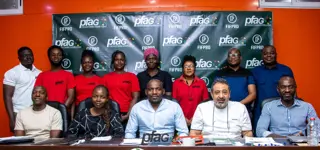
Can you share one of your proudest moments or achievements working as a union representative?
Helping a former professional footballer who had fallen into drug addiction after retirement. He was once a well-known player, but life after football hit hard. He turned to drugs, and by the time PFAG got wind of it, his health was in serious decline. As a union, we acted quickly, raised funds, and got him into rehab. I stayed closely involved throughout, attending his progress meetings, ensuring he had all he needed during rehab and supporting him through every stage of his recovery.
After more than a year of being in rehab, we saw tremendous progress. He started to come back to himself; physically, emotionally, and mentally. Though he passed away some time after leaving rehab, his final days were marked with hope, joy, and a sense of fulfilment.
It was heartbreaking, but also deeply humbling. I’m proud we could be there for him when he needed it most. It also reinforced something I now carry with me always: we are all responsible for our health and wellbeing, but no one should have to face life’s hardest moments alone.
What is one lesson you have learned from working closely with players?
That education cannot be overemphasised. While many players are focused on developing their talent on the pitch, I have seen firsthand how important it is for them to also invest in their education. A football career can be unpredictable and, in many cases, short-lived. Injuries, contract issues, or early retirement can completely alter a player’s path. Without a solid educational foundation – formal and informal – many players find themselves unprepared for life after football.
Beyond preparing for life after their playing days, education also empowers players to make more informed decisions during their career – be it understanding a contract, managing their finances, or even communicating effectively with clubs and agents. Education gives them the confidence and tools to advocate for themselves. Players who continue to learn and grow off the field often demonstrate better discipline, adaptability, and leadership. They understand the value of planning for the future and are more likely to succeed beyond football.
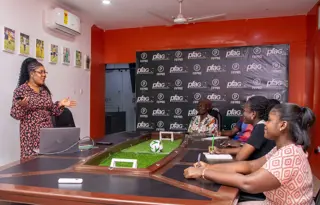
How do you stay motivated as a woman working in the football industry?
Working in a male-dominated space can be challenging, but I remain motivated by the knowledge that my work impacts players’ lives and empowers younger women to believe they can succeed with dignity in any environment. It has never been about holding a position; I am driven by purpose, committed to creating change, and contributing meaningfully to a football industry that values equality and inclusiveness.
Who are the women – inside or outside of football – who have inspired your journey in this field?
Mercy Tagoe-Quarcoo. Her journey from being a national team player to becoming a coach, and being a strong advocate for women’s football in Ghana, has shown what is possible when passion meets hard work. She has carved out a path defined by resilience and leadership. She was the first woman to coach a national football team in Ghana, and she did so with poise and competence, often under intense scrutiny. She has faced numerous challenges that come with breaking barriers in a traditionally male space, yet she continues to lead with grace and conviction.
